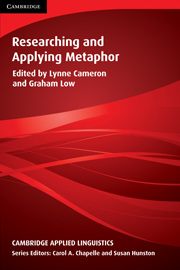Series editors' preface
Published online by Cambridge University Press: 05 October 2012
Summary
Metaphor, or the means by which one thing is described in terms of something else, has been described as a central tool of our cognitive apparatus. It is central to our understanding of how language, thought and discourse are structured. Consequently the study of metaphor has been of interest to scholars in a wide range of disciplines, including linguistics, psychology, philosophy and literature. While the role of metaphor in language has been a focus of considerable interest in linguistics and other fields since the pioneering work of Lakoff and Johnson and has been the focus of several thousand journal articles, it has received much less attention within applied linguistics. The present book therefore provides a valuable introduction to and overview of the field of metaphor studies while focussing particularly on issues likely to be of significance to students and practitioners of applied linguistics.
The papers in the book cover a wide range of issues in metaphor research, including approaches to metaphor theory, the nature of metaphorical language, metaphor as process and product, teachers' and learners' use of metaphors in conceptualizing their work and investigative methods in metaphor research. A number of different contexts for metaphor use are illustrated, including academic discourse, second language teaching, first language use, dictionary compilation and work with the seriously ill. Fascinating examples are given of how metaphors shape the description of many topics in discourse and how much of our experience of life is described in metaphoric terms.
- Type
- Chapter
- Information
- Researching and Applying Metaphor , pp. x - xiPublisher: Cambridge University PressPrint publication year: 1999
- 1
- Cited by



